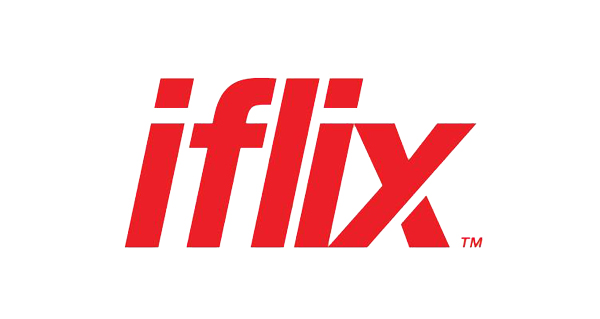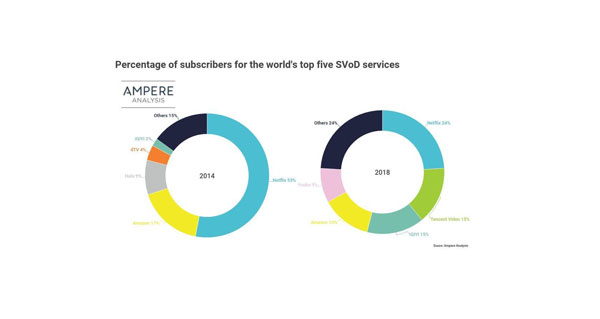Kaichen Li discussed the Southeast Asian aspirations of the Chinese online streaming giant Tencent Video during his APOS Virtual Series keynote.
Tencent acquired the distressed Southeast Asian streamer iflix earlier this year and has been building WeTV as a streaming brand outside of China. “WeTV is focusing on the Asian markets outside of mainland China,” said Li, who serves as the head of WeTV and iflix at Tencent. “We first launched in Thailand and then followed up with Indonesia, Malaysia, Philippines and Vietnam. The strategic approach is offering our users the best quality Asian content and also well-rounded entertainment. With the recent acquisition of iflix, we feel that there is huge potential for synergies with our existing business.”
For example, the demographics of WeTV and iflix are “very complementary to each other,” Li said. “They are both young audiences. So when we look at some of our content lineup, we believe it can travel very well on both platforms. Also, naturally, with the acquisition of iflix, that content can reach a significant amount of additional users. And secondly, iflix has relatively strong brand awareness in the primary markets in Southeast Asia. We believe that is something we can leverage to uplift the brand awareness of WeTV in the short term as well. And thirdly, we have retained some of the core team at iflix, especially in those markets where we previously didn’t have local teams. With the support of them, we can definitely ramp up the growth and presence of both WeTV and iflix in those markets.”
On the competitive landscape in Southeast Asia—with Disney+ Hotstar joining the fray this month—Li said, “The development trajectory of the OTT market in SEA will be very similar to China. If you look at the market landscape in China six or seven years ago, there were 50 OTT players in the market. Gradually it was consolidated. In 2020 there are only four or five meaningful players left in the market.”
The Southeast Asian market is “quite unpredictable,” Li continued. “Every new player will be more mindful to enter this market.”
As for Tencent’s competitive edge in the region with its platforms, Li stated: “I want to emphasize we will grow our business in a much more sustainable way. We’re not going to burn the money and try to buy out all the content to achieve sudden growth without looking at the P&L. We genuinely believe this is a long-term battle. Secondly, the strong support from Tencent Video will be a differentiator. Not only on the content side but also years of experience in content strategy, operations, technology, that has been proven successful in China. Many of these experiences can be replicable for our operation in the SEA market. We already see that is working, especially in Thailand. We are pretty confident that this is also going to work well in the rest of our key markets in SEA in the future. And thirdly, given iflix has been in the market for quite a few years and they have a lot of content insights; that is very valuable to help us form the right content strategy and make the right decisions when we select which titles to green light.”
Prior to acquiring iflix, Tencent had already been reaching out to key content providers in Southeast Asia, Li said, especially in Thailand and Indonesia. “For next year there will be more and more new partnerships as we build upon our operations there,” with local content playing a key role on the platforms. “The extent of localization on WeTV differs across markets. For some markets, we have a substantial portion of the local content; for some, we don’t. In order to achieve a scale local content offering, it’s important for us to work with the TV stations rather than solely rely on originals. In Thailand, we’ve announced an important partnership with BEC World. Also, the audience for free to air and OTT will be different. Some stories that might not be attractive for the free-to-air audience could be very appealing to our platform’s audience. For that type of story, we will try to go for originals, but it’s going to be very selective.”
As for how Tencent Video’s Chinese content travels across the region, Li noted, “Our ambition is to provide our audience with the best Asian content. The offering of the Chinese content from Tencent Video is going to be an important piece. WeTV is the first platform that is able to offer the latest Chinese content to SEA audience. Before that, I assume the perception of Chinese content in SEA was closely tied up with Hong Kong kung-fu movies and also classic TVB content. In the past four to five years, the content industry in China has changed significantly, largely due to the fierce competition between the OTT players in the market and the capital injection into the industry. So in terms of both production quality and the sophistication of stories, it has improved significantly. I think the level of quality of our latest content is very close to some of the Korean shows.”
Asked about if Southeast Asian content can make it into China via Tencent Video, Li said, “We want to play an important role in that,” referencing the BEC World deal that includes the rights to three titles that will be simulcast on Tencent Video in China. “Thai content has become more and more popular in China. We believe we can replicate that with Indonesia content, Malaysian content, Vietnamese content. We see that as one of our most important ambitions.”
 TVASIA
TVASIA






